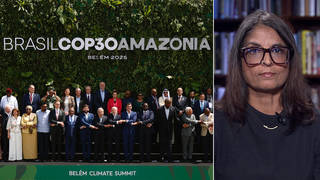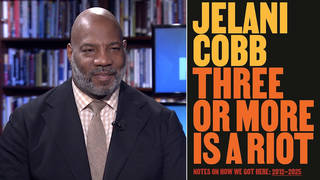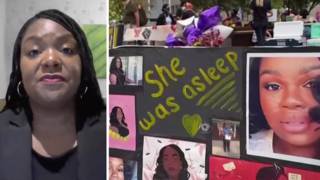
Guests
- Shaun KingBlack Lives Matter activist and the senior justice writer for the New York Daily News.
On the 50th anniversary of the Black Panther Party, some are comparing the party to the Black Lives Matter movement. We get response from Shaun King, a Black Lives Matter activist and senior justice writer for the New York Daily News, who has recently spent time with the party’s co-founder, Bobby Seale. “If you look at where we are now versus where the Black Panther Party was at the same time, I think we’re doing well,” King says. Still, he notes, “The Black Lives Matter movement is not a carbon copy of what the Black Panther Party did. How we do what we do will be uniquely different. Our time is different.”
Transcript
AMY GOODMAN: It is the 50th anniversary of the Black Panthers. This week, the British website Spiked published an article in which Elaine Brown, former chair of the Black Panther Party, said, quote, “Black Lives Matter has a plantation mentality.” She added, quote, “The next wave of young people running out here, who are complaining and protesting about the murders of young black men and women by the police all over the country, they will protest but they will not rise up in an organized fashion, with an agenda, to create revolutionary change. … We advocated community self-defense organizations to be formed, so that we would not be assaulted by the police, so that we would bear arms and assume our human rights.” Your response to Elaine Brown’s critique, and then the trajectory from Black Panthers to Black Lives Matter?
SHAUN KING: Well, you know, I love the Black Panther Party. I spent some time over the past few weeks with Bobby Seale, the co-founder of the Black Panther Party. And he loves the Black Lives Matter movement and has been immensely supportive, encouraging, not only to me but to many activists. So I was disappointed in what—in what Elaine said. And I know Elaine. I’ve talked with her many times.
When Elaine got involved in the Black Panther Party, it was about two years old. And that’s where we are in the Black Lives Matter movement, as well. And so, I think some of what she did was she evaluated the totality of the Black Panther Party and all that it accomplished in 10 years, and compared it to where we are right now in year two. And so, it’s an unfair comparison to say where we are in year two compared to where the Black Panther Party was in year two. Two years in, it literally only had 4,000 or 5,000 people, the Black Panther Party, that were committed to it, to its practices. And it was still trying to determine where it went and what it would do. And so, I think if you look at where we are now versus where the Black Panther Party was at this same time, I think we’re doing well.
I understand her criticism saying, you know, what are they doing compared to what they accomplished. But even some of us look at the dangers of what happened to Black Panther leaders, from targeted assassinations to COINTELPRO, and some of the lessons that we learned from them has caused us to change our methods. And so, the Black Lives Matter movement is not a carbon copy of what the Black Panther Party did. How we do what we do will be uniquely different. Our time is different. So, I respect her, revere her and admire her, but I was disappointed to read some of what she said.
JUAN GONZÁLEZ: And more importantly, the Black Panther Party was an organization, Black Lives Matter is a movement, which has come up, really, in a spontaneous fashion from all around the country, whereas the Panthers started in one place as a disciplined organization. It’s a very different form of attempting to achieve social change.
SHAUN KING: Sure. And what I found is, not just with Elaine, but with many of our elders, is that they are unaware that the Black Lives Matter movement does have a comprehensive platform, that there are hundreds of organizations that see themselves as a part of this movement in all 50 states all across the country, and they have the own policy platforms. And it’s difficult for one person, her or anybody else, to wrap their mind around the specific fights and battles that we are fighting. So a lot of people just aren’t informed to how organized this movement really is.
AMY GOODMAN: Shaun King, before we wrap, injustice boycott initiative, explain what it is in this last minute.
SHAUN KING: Yeah, on December the 5th, hundreds of thousands of us are coming together to boycott injustice in this country. And what we mean by that is, we believe there are not only cities and states which continue to underwrite the cost of injustice, that continue to back it and support it, be it police brutality or racial violence, but also corporations that are behind it and either say nothing or do nothing or, even worse than that, are specifically backing the police departments which continue to be brutal all over this country. So we’re launching a targeted boycott on December the 5th, not for a day or two days, but our model really is the Montgomery Bus Boycott, which lasted for 381 days until they saw change. So—
AMY GOODMAN: Do you have corporations targeted?
SHAUN KING: We do, and we’ll be announcing those on December the 5th. And we’re holding our cards close to our chest until then, but we do have corporations we’ll be targeting, as well.
AMY GOODMAN: So, Shaun King, we want to thank you so much for being with us, Black Lives Matter activist, senior justice writer for the New York Daily News. And we will link to your columns at democracynow.org.
SHAUN KING: Thank you.











Media Options